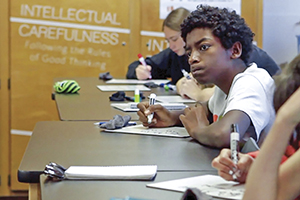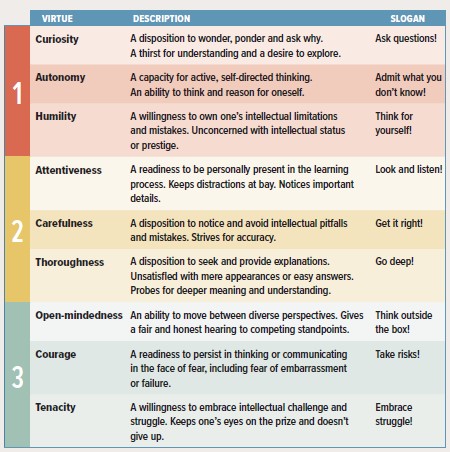Intellectual Virtues and the Formation of Good Citizens
May 01, 2022
Drawing on Project Zero research, a middle school in Long Beach, Calif., explores the character strengths that support democracy

Perhaps now more than ever, the demands of good citizenship extend not merely to how we behave in the public square, but also to how we think, reason, acquire evidence, assess arguments and respond to people with whom we disagree.
On a daily
basis, we are flooded with information on matters of considerable political importance. Often, this information is inconsistent and its quality is difficult to assess. How are we to know which sources to trust?
We can resolve to “trust
the experts,” but assessing a particular person’s claim of expertise can itself be a formidable challenge. What’s more, sometimes even credible experts don’t see eye to eye. In the present milieu, we also may be tempted to
demonize and dis-miss people with whom we disagree. From the standpoint of our respective filter bubbles and epistemic cocoons, our political adversaries can appear out of their minds, or worse.
This is not a recipe for healthy democracy.
For a democracy to function well, its citizens need access to credible information about a range of political, legal, scientific, economic, historical, educational and other issues. They must be equipped to evaluate this information carefully, intelligently
and patiently. While thinking for themselves and drawing their own conclusions, they also must be mindful of their intellectual limitations and be willing to rely on and trust those who are most knowledgeable.
In the face of political disagreement,
democratic citizens must expose themselves to multiple perspectives and give these perspectives a fair and honest hearing. They must resist the temptation to caricature and demonize people or ideas they disagree with.
This Content is Exclusive to Members
AASA Member? Login to Access the Full Resource
Not a Member? Join Now | Learn More About Membership
Nine Ways of Being Smart at Our School

Intellectual virtues are the character strengths of good thinkers and learners. They include qualities like curiosity, open-mindedness, intellectual humility and intellectual courage.
Intellectual virtues exist at the intersection of personal
character and academic ability. Like other character strengths, intellectual virtues say something important about who we are as persons, about what we desire, what we care about and how we are disposed to act, think and feel. Like other academic abilities,
intellectual virtues are “epistemically oriented,” that is, they equip us to acquire knowledge, ask penetrating questions, evaluate evidence, make logical inferences and so on.
Importantly, intellectual virtues are distinct from
natural intellectual ability or “natural intelligence.” Naturally “smart” people can be intellectually lazy, careless or arrogant. Persons of average natural intelligence can be admirably inquisitive, careful, honest, open and
fair in their thinking. In fact, the latter can be understood as ways of being smart, ways that happen to be compatible with a wide range of natural ability levels. Martin Luther King Jr. made a similar point when he observed, “One does not need
to be a profound scholar to be open minded nor a keen academician to engage in an assiduous pursuit of truth.”
At the Intellectual Virtues Academy of Long Beach, we focus on the following nine core virtues, or nine different ways of “being
smart,” which are divided into three groups:
(1) virtues necessary for getting the learning process started and headed in the right direction;
(2) virtues necessary for executing well or keeping the learning process
on track; and
(3) virtues necessary for overcoming familiar obstacles to learning.
Advertisement
Advertisement
Advertisement
Advertisement


